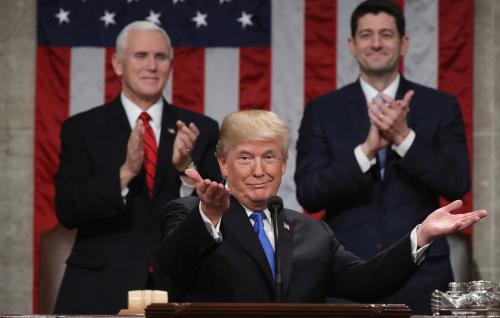In this report, the authors trace the extent, causes, and implications of the recent rapid decline in short- and medium-term budget prospects. In May 2001, the Congressional Budget Office’s baseline budget projected surpluses of $5.6 billion in the unified budget and $3.1 trillion outside of social security for fiscal years 2002 to 2011. By October 2001, each of those figures had fallen by about $3 trillion. Since fiscal 2002 did not begin until October 1, 2001 the figures imply that almost all of the non-social-security surplus for the coming decade was used up before the decade even began.

Terrorism & Extremism
Brookings experts on Trump’s first State of the Union

Commentary
The Changing Budget Outlook: Causes and Implications
November 19, 2001